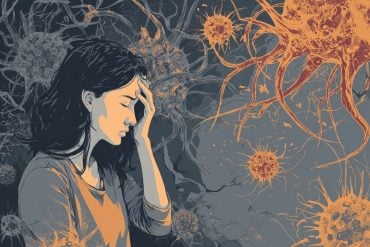Summary: The anti-aging drug Rapamycin only prolongs the lifespan of females according to research using fruit fly and mouse models. Rapamycin increased autophagy in female intestinal cells, but not in males. Findings suggest biological sex may be a crucial factor in the effectiveness of anti-aging drugs.
Source: UCL
The anti-aging drug rapamycin only prolongs the lifespan of female fruit flies, but not that of males, finds a new study co-led by UCL researchers.
Working with researchers from the Max Planck Institute for Biology of Ageing in Cologne, the team reports in Nature Aging that in addition, rapamycin only slowed the development of age-related pathological changes in the gut in female flies.
The researchers conclude that the biological sex is a crucial factor in the effectiveness of anti-aging drugs.
In humans, the life expectancy of women is significantly higher than that of men. However, women also suffer more often from age-related diseases and adverse drug reactions.
Co-lead author Dr Yu-Xuan Lu (Max Planck Institute for Biology of Ageing) said: “Our long-term goal is to make men live as long as women and also women as healthy as men in late life. But for that, we need to understand where the differences come from.”
The researchers gave the anti-aging drug rapamycin to male and female fruit flies to study the effect on the different sexes. Rapamycin is a cell growth inhibitor and immune regulator that is normally used in cancer therapy and after organ transplantations. They found that rapamycin extended the lifespan and slowed age-related intestinal pathologies in female flies but not in males.

The researchers observed that rapamycin increased autophagy – the cell’s waste disposal process – in the female intestinal cells. Male intestinal cells, however, already seem to have a high basal autophagy activity, which cannot be further increased by rapamycin. The scientists could also see this effect of rapamycin in mice. Female mice showed increased autophagy activity after treatment with rapamycin.
Dr Lu, who shared first authorship of the study with Dr Jennifer Regan (UCL Institute of Healthy Ageing, UCL Biosciences, and University of Edinburgh), said: “Previous studies found that females had greater responses to rapamycin on lifespan extension than did males in mice; we now uncover an underlying mechanism of these differences using flies.”
Senior author Professor Dame Linda Partridge (UCL Institute of Healthy Ageing, UCL Biosciences, and Max Planck Institute for Biology of Ageing) said: “Sex can be a decisive factor for the effectiveness of anti-aging drugs. Understanding the processes that are sex-specific and determine response to therapeutics will improve the development of personalized treatments.”
Funding: The study was funded by the CECAD Cluster of Excellence for Aging Research.
About this aging research news
Author: Chris Lane
Source: UCL
Contact: Chris Lane – UCL
Image: The image is in the public domain
Original Research: Open access.
“Sexual identity of enterocytes regulates autophagy to determine intestinal health, lifespan and responses to rapamycin” by Yu-Xuan Lu et al. Nature Aging
Abstract
Sexual identity of enterocytes regulates autophagy to determine intestinal health, lifespan and responses to rapamycin
Pharmacological attenuation of mTOR presents a promising route for delay of age-related disease.
Here we show that treatment of Drosophila with the mTOR inhibitor rapamycin extends lifespan in females, but not in males. Female-specific, age-related gut pathology is markedly slowed by rapamycin treatment, mediated by increased autophagy.
Treatment increases enterocyte autophagy in females, via the H3/H4 histone-Bchs axis, whereas males show high basal levels of enterocyte autophagy that are not increased by rapamycin feeding.
Enterocyte sexual identity, determined by transformerFemale expression, dictates sexually dimorphic cell size, H3/H4-Bchs expression, basal rates of autophagy, fecundity, intestinal homeostasis and lifespan extension in response to rapamycin.
Dimorphism in autophagy is conserved in mice, where intestine, brown adipose tissue and muscle exhibit sex differences in autophagy and response to rapamycin.
This study highlights tissue sex as a determining factor in the regulation of metabolic processes by mTOR and the efficacy of mTOR-targeted, anti-aging drug treatments.






